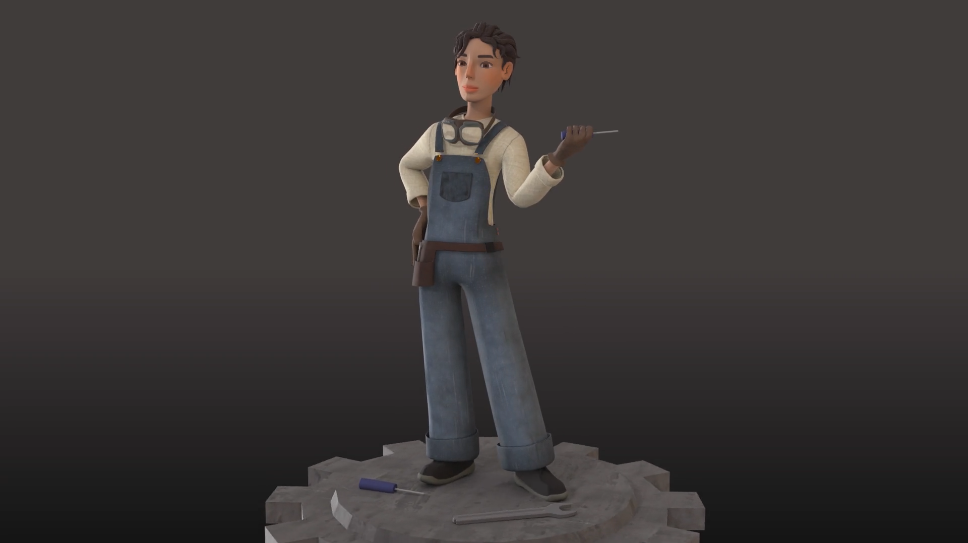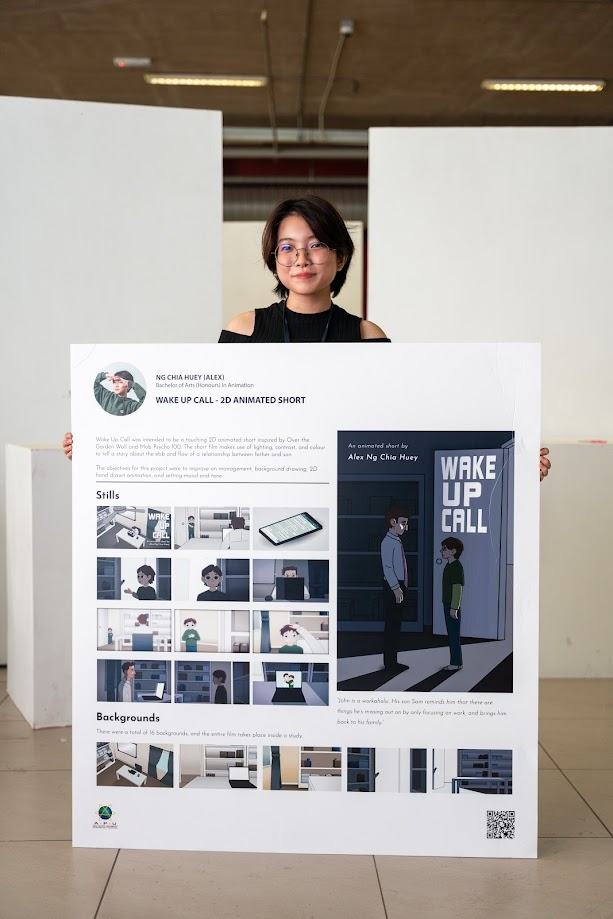Frame by Frame: Alex Ng’s Journey Through Animation

Ethan Quar
September 22, 2025
Alex Ng is the lead animator at Orca Cognitive Solutions, a startup developing a brainwave-powered mobile game. A graduate of APU’s animation degree, she now handles both 3D modelling and animation as the team’s only artist, carrying forward a passion that began with childhood sketches and was shaped by years of persistence and discovery.
First inspired by films like Spirited Away, she grew up with a fascination for animation as both art and storytelling.
Studied animation at APU during the pandemic, beginning online before shifting to in-person classes that refined her skills.
Explored both 2D and 3D animation, producing a solo short film and leading a 3D team project in her final year.
Joined Orca Cognitive Solutions as an intern before becoming lead animator, responsible for the entire rigging and animation pipeline.
Sees both challenges and opportunities in the rise of AI, but believes collaboration and artistry will keep animation unique.
Before the credits roll, before stories unfold on screen, there is always a frame: a drawing, a rig, a movement that makes a character come alive. For Alex Ng, animation has always been about chasing that moment. It began with sketches as a child and carried her through long nights of assignments at university, each project another attempt at capturing life through lines.
Today, she works as the lead animator at Orca Cognitive Solutions, a young startup developing a brainwave-powered mobile game. She is currently the only artist on the team, responsible for both 3D models and animations, from characters’ quirks to the way they breathe when standing still. It is demanding work, but for Alex, it is also the natural extension of a fascination she has carried since childhood, that animation is a medium where art and storytelling come together.
A Childhood Shaped by Frames
Alex began drawing when she was four. Like many in her field, she grew up with cartoons and films, yet it was Hayao Miyazaki’s Spirited Away that first made her pause. Compared to the lighthearted shows she had watched on television, the Studio Ghibli film seemed to exist on an entirely different plane. Every shot felt deliberate, every frame as detailed as a painting. It was the first moment she acknowledged animation as a true form of artistry. “It made me realise that animation could be so much more detailed,” she said.
Her inspirations stretched beyond Miyazaki. She admired the path of Mr. Lawrence, who began as an animator before becoming the voice of Plankton in SpongeBob and later a head writer for the series. For Alex, his career was proof of how animation and writing could be inseparable. “I think it’s really interesting to be part of both teams.”
As a child, Alex once imagined herself as a writer, too. She still feels she lacks the ‘grand story’ she wants to tell, but she believes it will come with time. For now, she sees her work as building the foundation for that moment, learning to shape characters and worlds until her own story is ready.
Choosing Animation as a Path
By the time she finished her AUSMAT at Sunway College, Alex was sure she wanted to pursue animation; she considered One Academy and Asia Pacific University of Technology and Innovation (APU).
One Academy had a strong reputation, but it only offered a diploma in animation. Alex wanted a degree that would allow her to explore both the creative and technical aspects of the field. With limited local options, she chose APU, a decision that would define the next three years of her life.
She didn’t know it yet, but her timing would make those years anything but ordinary. Starting in 2021, her first experiences of university would take place entirely online, setting the stage for a journey shaped as much by resilience as by artistic discovery.
Finding Her Voice at APU
Alex began her degree at APU in 2021, right in the middle of the pandemic. For the first year and a half, classes took place entirely online. She got through her assignments in her bedroom, connected with coursemates through WhatsApp, and waited for the day when campus would reopen. When it finally did, the experience of meeting people she had only known through a screen felt surreal. “You spend months talking to people online, and then when you finally see them, it’s strange. You don’t expect their face to match what you had in your head.”
An introvert by nature, Alex did not spend more time on campus than necessary. She went to classes, sometimes joined friends for meals, and preferred to work from home. What mattered most was the learning itself, especially once she could get in-person feedback. Online, lecturers had to talk her through every click and shortcut, which was slow and confusing for a subject as technical as 3D animation. In person, they could simply walk over and show her what she was missing. That immediacy made all the difference.
It was also during these years that Alex’s creative direction began to shift. She entered APU with her heart set on 2D animation, inspired by the films she had grown up with. But as she gained exposure to 3D modelling and animation, she realised there was another side to the field that spoke to her. By her final year, she was balancing both.
 Her team project was a 3D project, where she served as project manager, taking on multiple roles and guiding her peers through the process. For her solo short film, however, she returned to 2D. She describes the choice as stubbornness, a desire to honour the medium she had loved since childhood. The film told the story of a father too absorbed in work to notice his son growing up before his eyes. It was simple, heartfelt, and, in her view, far from perfect — but it carried her voice.
Her team project was a 3D project, where she served as project manager, taking on multiple roles and guiding her peers through the process. For her solo short film, however, she returned to 2D. She describes the choice as stubbornness, a desire to honour the medium she had loved since childhood. The film told the story of a father too absorbed in work to notice his son growing up before his eyes. It was simple, heartfelt, and, in her view, far from perfect — but it carried her voice.
Looking back, Alex admitted she would have done things differently. “I think I could have done it in 3D,” she reflected. “The outcome was simple, but it served its purpose.” She also came to recognise something about herself as a creator: she gravitated toward earnest and emotional stories, while humour felt almost out of reach. It left her with the sense that her storytelling voice was still in formation, a process she believes will continue as she gains more experience.
Shaping Characters in a Changing Industry
Alex’s first steps into the professional world came through an internship at Orca Cognitive Solutions, a small startup developing a mobile game powered by brainwave technology. When she joined full-time after graduation, she became the company’s lead animator — and, for now, its only artist. From character models to idle screen loops, she is responsible for the look and movement of every asset in the game.
With no seniors to guide her, she had to teach herself much of the rigging-to-animation pipeline. The process was challenging, but she found freedom in the independence it gave her. As both rigger and animator, she could design with her own workflow in mind, making changes without having to wait on anyone else. What excites her most is the individuality she can build into each character. “A character might have wings, which means I have to rig the wings and design animations that make them move in a unique way. Those small touches are what I enjoy most.”
Her work at Orca has given her both ownership and perspective. The animation field itself, however, feels less stable than when she first dreamed of entering it. In recent years, she has noticed how artificial intelligence has crept into the space. “I never even had the idea that AI could create images that look like 3D animation,” she said. “Now I see ads on TikTok and even billboards using AI-generated work.” She finds it troubling, not only because of what it could mean for jobs, but also because many of these tools are trained on stolen art.
Even so, Alex is not without hope. For her, the artistry and collaboration at the heart of animation remain irreplaceable. “It’s still a long way from replacing Pixar,” she said. In her view, animation’s value lies in how it brings together voice actors, artists, and storytellers to create something that cannot exist any other way.
Dreaming Forward
For now, Alex is content to keep learning, whether in Malaysia or beyond. She is open to opportunities wherever they arise, though her ultimate goal is simple: to one day direct her own movie or show. “I’m still figuring it out,” she admitted. “I don’t think I have the story worth telling yet, but maybe that will come with more experience.”
Alex knows she has not yet reached the story she wants to tell. But in every sketch, every rig, every minor quirk she adds to a character, she is moving closer. Animation, for her, is not about chasing perfection but about capturing life, frame by frame. And as long as she keeps drawing, she believes the story will arrive in its own time.



